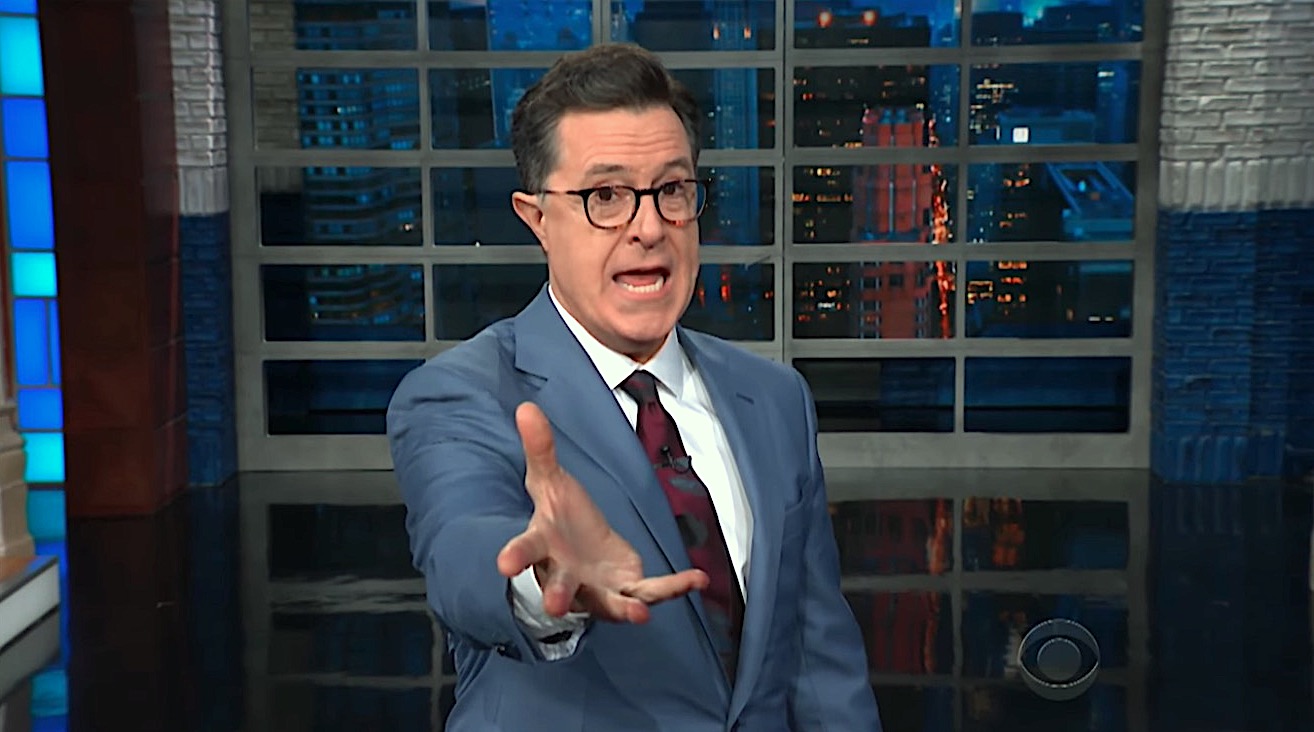Stephen Colbert is pretty sure Michael Cohen was a bad investment for Russian oligarchs, drugmakers, AT&T


A free daily email with the biggest news stories of the day – and the best features from TheWeek.com
You are now subscribed
Your newsletter sign-up was successful
On Tuesday night, Stormy Daniels' lawyer Michael Avenatti released documents, later confirmed, showing that President Trump's lawyer Michael Cohen had gotten millions from companies. A Russian oligarch's U.S. subsidiary paid Cohen $500,000, and AT&T ponied up, Stephen Colbert said on Wednesday's Late Show. "You paid for insights into this administration? He's a horny old racist who likes cheeseburgers more than his children — $200,000, please."
Drugmaker Novartis chipped in seven figures. "Side effects of taking money from Novartis may include headache, nausea, and extended jail time," Colbert said. "So they paid $1.2 million for access to the same administration that let Michael Wolff just sit around writing down everything he saw? No wonder drugs cost so much." The payments were all made in what Colbert jokingly called "crime-sized" chunks, "because the whole thing was supposed to be under the radar," he said, repeating a pertinent question from a source close to the deals: "How the f--k did Avenatti find out?"
"It's pretty crazy that the Stormy Daniels money could be traced all the way back to Vladimir Putin," Jimmy Fallon said on The Tonight Show. "In response, Putin said, 'Donald can spend allowance however he wants.'" This is "why Trump calls Putin his Sugar Vladdy," he added.
The Week
Escape your echo chamber. Get the facts behind the news, plus analysis from multiple perspectives.

Sign up for The Week's Free Newsletters
From our morning news briefing to a weekly Good News Newsletter, get the best of The Week delivered directly to your inbox.
From our morning news briefing to a weekly Good News Newsletter, get the best of The Week delivered directly to your inbox.
"Meanwhile, great news from North Korea — is not a sentence I was expecting to say, but it's actually true," Colbert said, pointing to the release of three Americans held by North Korea. "So credit where credit is due: The return of these prisoners is a good thing that Donald Trump helped happen. We can put it right up there with humiliating Ted Cruz and ... that's it." And CIA director nominee Gina Haspel "attempted to put her past behind her" at Wednesday's Senate confirmation hearing, "and like me, some of the senators there were not convinced that Haspel's torturing days were behind her," he said, helpfully reminding her that Trump favors waterboarding and worse. Watch below. Peter Weber
A free daily email with the biggest news stories of the day – and the best features from TheWeek.com
Peter has worked as a news and culture writer and editor at The Week since the site's launch in 2008. He covers politics, world affairs, religion and cultural currents. His journalism career began as a copy editor at a financial newswire and has included editorial positions at The New York Times Magazine, Facts on File, and Oregon State University.
-
 One great cookbook: Joshua McFadden’s ‘Six Seasons of Pasta’
One great cookbook: Joshua McFadden’s ‘Six Seasons of Pasta’the week recommends The pasta you know and love. But ever so much better.
-
 Scientists are worried about amoebas
Scientists are worried about amoebasUnder the radar Small and very mighty
-
 Buddhist monks’ US walk for peace
Buddhist monks’ US walk for peaceUnder the Radar Crowds have turned out on the roads from California to Washington and ‘millions are finding hope in their journey’
-
 ‘One Battle After Another’ wins Critics Choice honors
‘One Battle After Another’ wins Critics Choice honorsSpeed Read Paul Thomas Anderson’s latest film, which stars Leonardo DiCaprio, won best picture at the 31st Critics Choice Awards
-
 A peek inside Europe’s luxury new sleeper bus
A peek inside Europe’s luxury new sleeper busThe Week Recommends Overnight service with stops across Switzerland and the Netherlands promises a comfortable no-fly adventure
-
 Son arrested over killing of Rob and Michele Reiner
Son arrested over killing of Rob and Michele ReinerSpeed Read Nick, the 32-year-old son of Hollywood director Rob Reiner, has been booked for the murder of his parents
-
 Rob Reiner, wife dead in ‘apparent homicide’
Rob Reiner, wife dead in ‘apparent homicide’speed read The Reiners, found in their Los Angeles home, ‘had injuries consistent with being stabbed’
-
 Hungary’s Krasznahorkai wins Nobel for literature
Hungary’s Krasznahorkai wins Nobel for literatureSpeed Read László Krasznahorkai is the author of acclaimed novels like ‘The Melancholy of Resistance’ and ‘Satantango’
-
 Primatologist Jane Goodall dies at 91
Primatologist Jane Goodall dies at 91Speed Read She rose to fame following her groundbreaking field research with chimpanzees
-
 Florida erases rainbow crosswalk at Pulse nightclub
Florida erases rainbow crosswalk at Pulse nightclubSpeed Read The colorful crosswalk was outside the former LGBTQ nightclub where 49 people were killed in a 2016 shooting
-
 Trump says Smithsonian too focused on slavery's ills
Trump says Smithsonian too focused on slavery's illsSpeed Read The president would prefer the museum to highlight 'success,' 'brightness' and 'the future'
